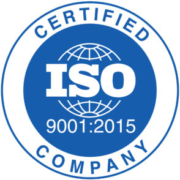Janus Worldwide Successfully Completes ISO 9001:2015 Certification Audit
In April 2018, Janus Worldwide successfully passed a surveillance audit proving that its QMS is fully compliant with ISO 9001:2015 requirements.
The new standard, along with the customer-oriented process approach previously integrated into ISO and the PDCA cycle, introduced a number of relatively new concepts, such as risk management, knowledge management, change management, and strategic management.
For the first time, an ISO standard now requires a company to have a growth strategy. The ISO 9001:2015 standard opens with a reminder that the company must have a “growth strategy that influences its ability to achieve the expected results.”
The standard introduces the concept of “organizational context,” which expands the sphere of implementation for QMS systems. The new version of the standard requires companies to consider a number of factors that can affect the system and its stability. In particular, almost every organization depends on external factors such as power usage, materials, procurement, the environment, etc. In addition, the organization’s QMS and general performance are significantly affected by its internal environment (for instance, corporate culture, corporate discipline, etc.) All of these things must be considered when planning, creating, and running a quality management system.
The new standard puts more emphasis on management roles. The developers are seeking to maximize management engagement in solving quality-control problems, and to delegate authority where necessary and provide proper support to responsible parties.
A company’s staff is its most important asset, and one that ensures its success and competitive advantage. A manager must be more than just an administrator; he or she must also be a leader who promotes the development of their staff’s creative potential and ensures that it is used to maximum effect.
The primary and most significant change introduced by the new version is the requirement for risk analysis, and decision-making based on the results of this risk analysis.
Risk management helps decision-makers make rational choices, prioritize, and find ways to solve problems. ISO 9001:2015 discusses the concept of “risk-oriented thinking” and requires broad application of risk management approaches. The selection of a specific risk evaluation method is left to the organization, but risks and opportunities must be evaluated when planning to accomplish goals.
We were delighted to see our compliance with ISO 9001:2015 criteria confirmed. Janus is not a company that rests on its laurels; rather we’re always growing, setting ourselves new and ambitious goals, and continuing to improve every aspect of our business. Perfection knows no bounds, so constant striving is one of the core values of our company.





